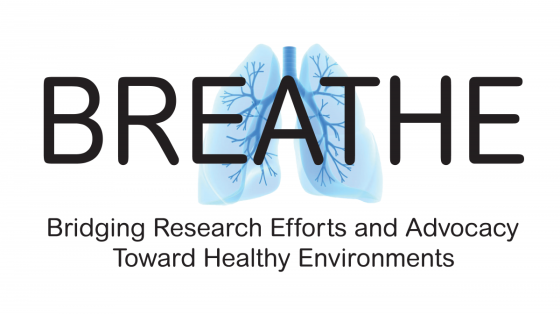BREATHE (Bridging Research Efforts and Advocacy Toward Healthy Environments), located at 2265 Harrodsburg Road in Lexington, Kentucky, is a multi-disciplinary research, outreach, and practice collaborative of the University of Kentucky (UK) College of Nursing, with partners internal and external to UK. BREATHE’S Vision is that all people will have access to clean air and live in healthy environments. BREATHE’S Mission is to promote lung health and healthy environments with at risk populations to achieve health equity through a) research; b) community outreach and empowerment; c) advocacy and policy development; and d) access to health services.
BREATHE, formerly known as the Clean Indoor Air Partnership, was recognized as one of UK’s Commonwealth Collaboratives, and it received the Exemplary Project Award for community engagement in 2011 from the Association of Public Land-Grant Universities (APLU). BREATHE has administrative and biostatistics cores, as well as an air quality monitoring laboratory. BREATHE consists of a large team of faculty researchers and clinicians, staff from a variety of disciplines, and students from both undergraduate and graduate programs. BREATHE provides facilitation for the UK Markey Cancer Center’s Comprehensive Lung Cancer Translational Research Group.
BREATHE is directed by Dr. Ellen J. Hahn, PhD, RN, FAAN with critical expert guidance provided by the BREATHE Advisory Board and over 80 organizational community partners. BREATHE is a clearinghouse for information, research and analysis, and policy development, as well as community education and outreach related to smoke- and tobacco- free policies, tobacco health disparities, electronic smoking devices, tobacco prevention and treatment, and radon reduction. BREATHE has had success working with both rural and urban communities and in economically diverse localities. BREATHE is comprised of four divisions: Tobacco Policy, Tobacco Prevention & Treatment, Radon Policy, and Special Populations. The Administration and Data Management & Outcomes units support faculty, staff, and students. See the BREATHE organizational chart here.
The Tobacco Policy Division includes the Kentucky Center for Smoke-free Policy (KCSP) and Go Tobacco-free. KCSP is a dissemination and implementation research center that assists communities with the development and implementation of smoke-free policy including protections from the use and distribution of emerging tobacco products. KCSP was created in December 2004 with seed money from The Robert Wood Johnson Foundation’s Tobacco Policy Change Program after launching a successful smoke-free campaign in Lexington, Kentucky. Go Tobacco-free is a valuable resource for campuses with tobacco-free policies or for those who want to adopt a tobacco-free policy. Go Tobacco-free provides technical assistance via email, conference calls, webinars, Skype and/or in person using an evidence-based policy implementation approach with a focus on compliance and evaluation. Go Tobacco-free is a collaborative network for individuals doing similar work, recognizing the importance of sharing lessons learned with others advocating for or implementing tobacco-free campus policies. Go Tobacco-free disseminates evidence-based resources including a monthly Campus Spotlight highlighting successful tobacco-free policies. Go Tobacco-free partners with organizations and campuses to conduct research and develop evidence-based tobacco-free policy practices.
The Tobacco Prevention & Treatment Division (TPT) develops and enhances tobacco screening and personalized treatment services in healthcare and community settings through prevention, treatment, education, and research. The TPT team offers a variety of trainings for health providers and professionals, including an intensive tobacco treatment specialist (TTS) training program. These trainings are intended to enhance engagement in tobacco dependence treatment and education with a focus on disparately affected populations.
The Radon Policy Division, developed in 2006 and funded in part by the Kentucky State Radon Program, houses an evidence-based community outreach and research center to raise awareness about the dangers of radon exposure and prompt action to reduce radon risks using evidence-based practices. Radon research focuses on reducing the synergistic risks of radon and tobacco smoke exposure. The two major programs within the Radon Policy Division are Provider Education and Geological Mapping. The Provider Education Program offers free continuing education credits for healthcare and public health professionals as well as materials to share with patients, providers, and community members. The Geological Mapping Program partners with the Kentucky Geological Survey, also located at the University of Kentucky, to evaluate radon potential using observed radon values and rock formation type and to create county-specific maps and information. The Radon Policy Division’s faculty and staff serve on the American Association of Radiation Scientists and Technologists (AARST) Foundation Board and the Kentucky Governor’s Radon Advisory Committee.
The Special Populations Division aims to reduce tobacco-related health disparities. Affiliated faculty are experts in tobacco use and tailored treatment approaches for vulnerable populations including women and children, youth and young adults, individuals with mental illness or substance use disorders, and members of the LGBT community. BREATHE faculty serve on the Substance Abuse and Mental Health Administration (SAMHSA) State Tobacco Policy Academy on Tobacco Control and Behavioral Health, a statewide collaborative process to address tobacco use among those with a behavioral health disorder. BREATHE faculty also serve on the advisory board for LGBT Healthlink, a CDC funded cancer and tobacco disparity network, which is a community driven group of advocates and professionals working to reduce tobacco use and cancer.

